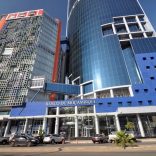Mozambique: New water pumping station will benefit 72,000 people in Maputo
Mozambique: Ministry of Finance will manage seized assets and goods

FILE - For illustration purposes only. [File photo: TVM]
The Ministry of Economy and Finance of Mozambique will, under a review of the body’s duties and powers, start managing assets and goods seized or recovered in the context of illicit or criminal activities in favour of the state.
The measure is contained in Presidential Decree 02/2024, dated March 4 and consulted today by Lusa, which recognizes the “need to review the responsibilities and competencies” of the Ministry of Economy and Finance.
Specifically, regarding the attributions that are already in force, the ministry currently led by Max Tonela will assume the “administration of assets and goods seized or recovered in favour of the State, within the scope of national proceedings or acts arising from legal cooperation and international judiciary.”
In the management of seized assets, the decree also establishes that the Ministry of Economy and Finance must “conserve, protect and manage the seized assets and goods in the custody of the State, in a diligent and zealous manner”, as well as “determine the alienation, capitalization, sale and allocation to public service or destruction of recovered assets”.
Since 2022, Mozambique has had a Central Asset Recovery Office (GCRA) in the Attorney General’s Office (PGR), with duties of investigation, tracking, seizure and recovery of assets, which in the first year of activity announced it had recovered more than a thousand million meticais (€14.3 million) of illicit origin, including 30 properties and 12 vehicles.
A source from the Ministry of Economy and Finance explained to Lusa today that this redefinition of competencies “will adapt the institution’s responsibilities to new developments, reinforcing transparency and good governance in crucial areas”.
One of “the main innovations” will result in the “creation of the Asset Management Office”, which will be “attached to the Finance sector, responsible for managing assets seized or recovered as part of illicit or criminal activities”.
“This measure aims to strengthen efforts to combat money laundering and the financing of illicit activities and will contribute to the efforts being made by the Government to remove Mozambique from the FATF ‘grey list’,” highlights the source.
The Ministry of Economy and Finance also officially assumes management of the Executive Coordination Committee for the removal of Mozambique from the “grey list” of the International Financial Action Task Force (FATF).
“The entity will play a fundamental role in strengthening the national financial system and implementing necessary actions to comply with international requirements for preventing and combating money laundering, financing terrorism and financing the proliferation of weapons of mass destruction,” adds the source.
Another aspect of the approved changes is the integration of the “climate change component in public expenditure programs”, as well as “the strengthening of climate financing mobilisation capabilities”.
“This measure will allow the country to access climate funds from international partners, intended for actions to adapt and mitigate the impacts of climate change, an increasingly pressing challenge,” the communication reads.
According to the ministry, the changes “represent an important step in consolidating [the executive’s] transparency and good governance”.
“Strengthening the capabilities of the Ministry of Economy and Finance in these areas will contribute to financial stability, international credibility and the sustainable development of the country,” it concludes.











Leave a Reply
Be the First to Comment!
You must be logged in to post a comment.
You must be logged in to post a comment.